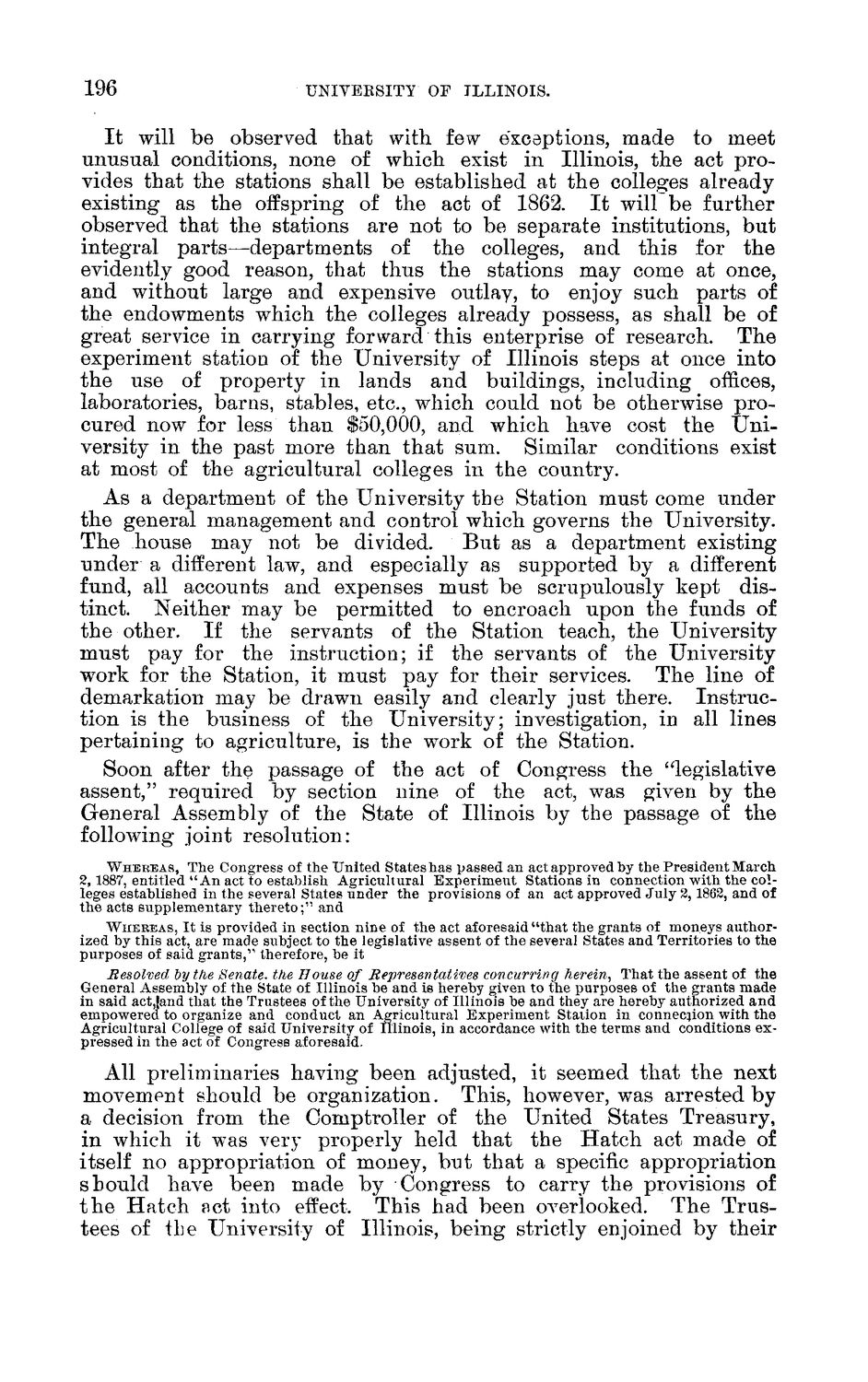| |
| |
Caption: Board of Trustees Minutes - 1888
This is a reduced-resolution page image for fast online browsing.

EXTRACTED TEXT FROM PAGE:
196 U N I V E R S I T Y OF ILLINOIS. It will be observed that with few exceptions, made to meet unusual conditions, none of which exist in Illinois, the act provides that the stations shall be established at the colleges already existing as the offspring of the act of 1862. I t will be further observed that the stations are not to be separate institutions, but integral parts—departments of the colleges, and this for the evidently good reason, that thus the stations may come at once, and without large and expensive outlay, to enjoy such parts of the endowments which the colleges already possess, as shall be of great service in carrying forward this enterprise of research. The experiment station of the University of Illinois steps at once into the use of property in lands and buildings, including offices, laboratories, barns, stables, etc., which could not be otherwise procured now for less than $50,000, and which have cost the University in the past more than that sum. Similar conditions exist at most of the agricultural colleges in the country. As a department of the University the Station must come under the general management and control which governs the University. The house may not be divided. But as a department existing under a different law, and especially as supported by a different fund, all accounts and expenses must be scrupulously kept distinct. Neither may be permitted to encroach upon the funds of the other. If the servants of the Station teach, the University must pay for the instruction; if the servants of the University work for the Station, it must pay for their services. The line of demarkation may be drawn easily and clearly just there. Instruction is the business of the University; investigation, in all lines pertaining to agriculture, is the work of the Station. Soon after the passage of the act of Congress the "legislative assent," required by section nine of the act, was given by the General Assembly of the State of Illinois by the passage of the following joint resolution: WHEREAS, The Congress of the United States has passed an act approved by the President March 2, 1887, entitled " A n act to establish Agricultural Experiment Stations in connection with the colleges established in the several States under the provisions of an act approved July 2, 1862, and of the acts supplementary thereto; 11 and WHEREAS, It is provided in section nine of the act aforesaid "that the grants of moneys authorized by this act, are made subject to the legislative assent of the several States and Territories to the purposes of said grants," therefore, be it Besolved by the Senate, the House of Bepresentatives concurring herein, That the assent of the General Assembly of the State of Illinois be and is hereby given to the purposes of the grants made in said act,|and that the Trustees of the University of Illinois be and they are hereby authorized and empowered to organize and conduct an Agricultural Experiment Station in connection with the Agricultural College of said University of Illinois, in accordance with the terms and conditions expressed in the act of Congress aforesaid. All preliminaries having been adjusted, it seemed that the next movement should be organization. This, however, was arrested by a decision from the Comptroller of the United States Treasury, in which it was very properly held that the Hatch act made of itself no appropriation of money, but that a specific appropriation should have been made by Congress to carry the provisions of t h e Hatch act into effect. This had been overlooked. The Trustees of the University of Illinois, being strictly enjoined by their
| |